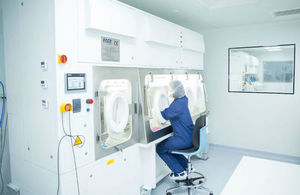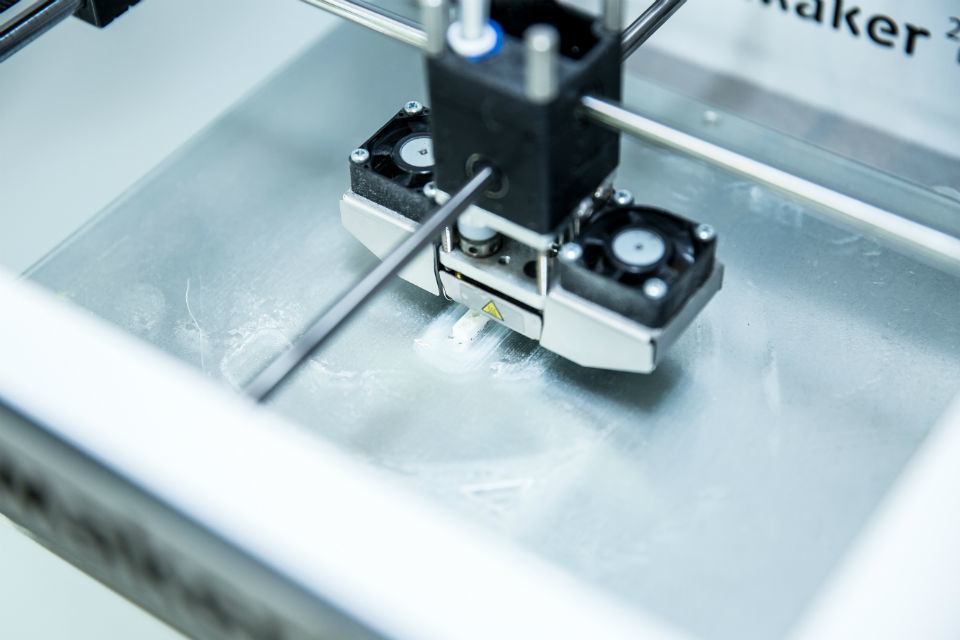Improved healthcare for all: pioneering projects get funding
Nearly £70 million to be invested under the Industrial Strategy Challenge Fund to speed up access to innovative medicines, including 2 new competitions.

MeiraGTx colleague in the company's facilities.
New initiatives to accelerate the development and manufacture of new medicines that could have real benefits to patients will share almost £50 million. The funding is from Innovate UK under the Industrial Strategy Challenge Fund.
This is the leading edge healthcare challenge, which supports UK businesses and researchers to develop and manufacture new medicines and vaccines, as well as digital health products and medical technologies. A total of £181 million will be invested over 4 years.
The challenge of manufacturing medicines
To stimulate the development and manufacture of novel medicines for patients, 22 projects involving 58 organisations will get £15 million.
One of those to receive funding is MeiraGTx, which develops novel gene therapies for patients with acquired and inherited disorders, such as Alzheimer’s and Parkinson’s disease.

MeiraGTx's Jon Telfer.
MeiraGTx will work with Touchlight Genetics and Symbiosis Pharmaceutical Services to develop a next-generation gene-therapy manufacturing platform.
The project will look at the manufacturing process for the adeno-associated virus. This virus infects humans but is not known to cause disease, making it a good candidate for gene therapies. It should help to deliver new treatments more quickly and efficiently.
New digital healthcare solutions
Innovate UK will also invest £8 million in 52 projects through the digital health technology catalyst, which aims to improve patient outcomes, access to healthcare and service delivery and treatments.
Digital therapeutics start-up Neurofenix will partner with Brunel University London to develop Gameball, an affordable and enjoyable rehabilitation programme for patients with neurological impairment, which includes people that have suffered strokes.
Patients will use a hand-controller and connected software to take part in digital games. It will provide upper-limb training to help patients regain mobility, an online community of support, as well as analytics on performance.

Neurofenix's Guillem Singla Buxarrais and Dimitris Athanasiou.
Centres for advanced therapies
£21 million will go towards setting up a network of 3 advanced therapies treatment centres that span the UK.
The centres will be alliances between the north of England and Scotland, and the Midlands and Wales, with the final site being based in Manchester.
This is a joint collaboration between hospitals, therapeutics development businesses and the supply chain. It should advance the use of pioneering cell and gene therapies with a large number of patients.
Building the UK’s capacity
Finally, a further £5.6 million will go to the manufacture and production of viral vectors.
Viral vectors are important to advanced therapies as the carrier of gene therapy treatments. However, there is a shortage of capacity for making viral vectors in the UK.
The projects funded under this competition will expand commercial capacity in the UK and increase the ability to produce viral vectors to be used in advanced therapy medicinal products.
Work will be conducted at 2 locations at Oxford and Keele, Staffordshire.

One of Neurofenix's 3D printers.
New opportunities
In addition to the almost £50 million already pledged under this challenge, a further £18 million will be made available to UK businesses and researchers in 2 new competitions.
There will be up to £8 million in the next round of the digital health technology catalyst. Up to £10 million will support collaborative research and development in medicines manufacturing.
These will open for applications in February and March 2018.
Sign up for Innovate UK’s newsletter or get alerts of news and competitions.
Developing research and innovation
Sam Gyimah, Minister for the Department for Business, Energy and Industrial Strategy, announced the funding today (22 January 2018) in a visit to Imperial College London.
The Minister also outlined plans to map UK’s research infrastructure to show strengths and identify any gaps. This will be the first major piece of work by UK Research and Innovation.